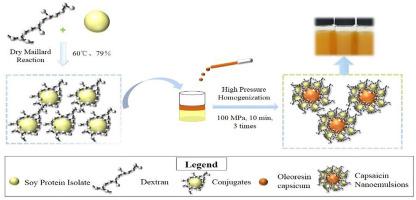当前位置:
X-MOL 学术
›
Food Hydrocoll.
›
论文详情
Our official English website, www.x-mol.net, welcomes your feedback! (Note: you will need to create a separate account there.)
The impact of soy protein isolate-dextran conjugation on capsicum oleoresin (Capsicum annuum L.) nanoemulsions
Food Hydrocolloids ( IF 10.7 ) Pub Date : 2020-11-01 , DOI: 10.1016/j.foodhyd.2020.105818 Yan Zhou , Fei Teng , Tian Tian , Rokayya Sami , Changling Wu , Ying Zhu , Li Zheng , Lianzhou Jiang , Zhongjiang Wang , Yang Li
Food Hydrocolloids ( IF 10.7 ) Pub Date : 2020-11-01 , DOI: 10.1016/j.foodhyd.2020.105818 Yan Zhou , Fei Teng , Tian Tian , Rokayya Sami , Changling Wu , Ying Zhu , Li Zheng , Lianzhou Jiang , Zhongjiang Wang , Yang Li

|
Abstract The purpose of this study was to conduct an in-depth investigation of the effects of soy protein isolate (SPI)-dextran (molecular weights 10, 40, 70, and 150 kDa) bonding on physical properties and environmental stability of oil-in-water emulsions containing capsaicin. Results of sodium dodecyl sulfate-polyacrylamide gel electrophoresis (SDS-PAGE) and Fourier transform-infrared (FT-IR) spectroscopy confirmed that SPI covalently links to dextran in dry-heated Maillard reactions (60 °C and 79% relative humidity). Dextran and SPI have the maximum conjugation yield at a molecular weight of 40 kDa. The capsaicin nanoemulsions were prepared using a high-pressure homogenization method with native SPI, the SPI-Dex mixture, and conjugates in an aqueous phase, and oleoresin capsicum in an oil phase. The mean particle diameter (Dz) of the capsaicin nanoemulsions stabilized by the SPI-Dex conjugates was significantly lower than that stabilized by SPI and the SPI-Dex mixture, particularly at 40 kDa. The pH, thermal stability, and storage stability of the capsaicin nanoemulsions stabilized by the SPI-Dex (40 kDa) conjugate were markedly improved and no appreciable creaming or flocculation was observed at 25 °C or 50 °C for 30 days. We concluded that the SPI-Dex conjugates formed by covalent bonding improved the physical stability of the nanoemulsion, which depended on the molecular weight of dextran. These results provide new insight into preparing highly stable nanoemulsions with good encapsulation efficiency.
中文翻译:

大豆分离蛋白-葡聚糖偶联对辣椒油树脂(Capsicum annuum L.)纳米乳剂的影响
摘要 本研究的目的是深入研究大豆分离蛋白 (SPI)-葡聚糖(分子量为 10、40、70 和 150 kDa)键合对油包油物理性质和环境稳定性的影响。 - 含有辣椒素的水乳剂。十二烷基硫酸钠-聚丙烯酰胺凝胶电泳 (SDS-PAGE) 和傅立叶变换红外 (FT-IR) 光谱的结果证实,SPI 在干热美拉德反应(60 °C 和 79% 相对湿度)中与葡聚糖共价连接。葡聚糖和 SPI 在分子量为 40 kDa 时具有最大的结合率。使用高压均质法制备辣椒素纳米乳剂,其中含有天然 SPI、SPI-Dex 混合物和水相中的偶联物,油相中含有辣椒油树脂。SPI-Dex 偶联物稳定的辣椒素纳米乳剂的平均粒径 (Dz) 显着低于 SPI 和 SPI-Dex 混合物稳定的平均粒径 (Dz),尤其是在 40 kDa 时。由 SPI-Dex (40 kDa) 偶联物稳定的辣椒素纳米乳剂的 pH 值、热稳定性和储存稳定性显着改善,并且在 25 °C 或 50 °C 下 30 天没有观察到明显的乳状液或絮凝。我们得出结论,通过共价键形成的 SPI-Dex 缀合物提高了纳米乳液的物理稳定性,这取决于葡聚糖的分子量。这些结果为制备具有良好封装效率的高度稳定的纳米乳液提供了新的见解。特别是在 40 kDa 时。由 SPI-Dex (40 kDa) 偶联物稳定的辣椒素纳米乳剂的 pH 值、热稳定性和储存稳定性显着改善,并且在 25 °C 或 50 °C 下 30 天没有观察到明显的乳状液或絮凝。我们得出结论,通过共价键形成的 SPI-Dex 缀合物提高了纳米乳液的物理稳定性,这取决于葡聚糖的分子量。这些结果为制备具有良好封装效率的高度稳定的纳米乳液提供了新的见解。特别是在 40 kDa 时。由 SPI-Dex (40 kDa) 偶联物稳定的辣椒素纳米乳剂的 pH 值、热稳定性和储存稳定性显着改善,并且在 25 °C 或 50 °C 下 30 天没有观察到明显的乳状液或絮凝。我们得出结论,通过共价键形成的 SPI-Dex 缀合物提高了纳米乳液的物理稳定性,这取决于葡聚糖的分子量。这些结果为制备具有良好封装效率的高度稳定的纳米乳液提供了新的见解。我们得出结论,通过共价键形成的 SPI-Dex 缀合物提高了纳米乳液的物理稳定性,这取决于葡聚糖的分子量。这些结果为制备具有良好封装效率的高度稳定的纳米乳液提供了新的见解。我们得出结论,通过共价键形成的 SPI-Dex 缀合物提高了纳米乳液的物理稳定性,这取决于葡聚糖的分子量。这些结果为制备具有良好封装效率的高度稳定的纳米乳液提供了新的见解。
更新日期:2020-11-01
中文翻译:

大豆分离蛋白-葡聚糖偶联对辣椒油树脂(Capsicum annuum L.)纳米乳剂的影响
摘要 本研究的目的是深入研究大豆分离蛋白 (SPI)-葡聚糖(分子量为 10、40、70 和 150 kDa)键合对油包油物理性质和环境稳定性的影响。 - 含有辣椒素的水乳剂。十二烷基硫酸钠-聚丙烯酰胺凝胶电泳 (SDS-PAGE) 和傅立叶变换红外 (FT-IR) 光谱的结果证实,SPI 在干热美拉德反应(60 °C 和 79% 相对湿度)中与葡聚糖共价连接。葡聚糖和 SPI 在分子量为 40 kDa 时具有最大的结合率。使用高压均质法制备辣椒素纳米乳剂,其中含有天然 SPI、SPI-Dex 混合物和水相中的偶联物,油相中含有辣椒油树脂。SPI-Dex 偶联物稳定的辣椒素纳米乳剂的平均粒径 (Dz) 显着低于 SPI 和 SPI-Dex 混合物稳定的平均粒径 (Dz),尤其是在 40 kDa 时。由 SPI-Dex (40 kDa) 偶联物稳定的辣椒素纳米乳剂的 pH 值、热稳定性和储存稳定性显着改善,并且在 25 °C 或 50 °C 下 30 天没有观察到明显的乳状液或絮凝。我们得出结论,通过共价键形成的 SPI-Dex 缀合物提高了纳米乳液的物理稳定性,这取决于葡聚糖的分子量。这些结果为制备具有良好封装效率的高度稳定的纳米乳液提供了新的见解。特别是在 40 kDa 时。由 SPI-Dex (40 kDa) 偶联物稳定的辣椒素纳米乳剂的 pH 值、热稳定性和储存稳定性显着改善,并且在 25 °C 或 50 °C 下 30 天没有观察到明显的乳状液或絮凝。我们得出结论,通过共价键形成的 SPI-Dex 缀合物提高了纳米乳液的物理稳定性,这取决于葡聚糖的分子量。这些结果为制备具有良好封装效率的高度稳定的纳米乳液提供了新的见解。特别是在 40 kDa 时。由 SPI-Dex (40 kDa) 偶联物稳定的辣椒素纳米乳剂的 pH 值、热稳定性和储存稳定性显着改善,并且在 25 °C 或 50 °C 下 30 天没有观察到明显的乳状液或絮凝。我们得出结论,通过共价键形成的 SPI-Dex 缀合物提高了纳米乳液的物理稳定性,这取决于葡聚糖的分子量。这些结果为制备具有良好封装效率的高度稳定的纳米乳液提供了新的见解。我们得出结论,通过共价键形成的 SPI-Dex 缀合物提高了纳米乳液的物理稳定性,这取决于葡聚糖的分子量。这些结果为制备具有良好封装效率的高度稳定的纳米乳液提供了新的见解。我们得出结论,通过共价键形成的 SPI-Dex 缀合物提高了纳米乳液的物理稳定性,这取决于葡聚糖的分子量。这些结果为制备具有良好封装效率的高度稳定的纳米乳液提供了新的见解。



























 京公网安备 11010802027423号
京公网安备 11010802027423号